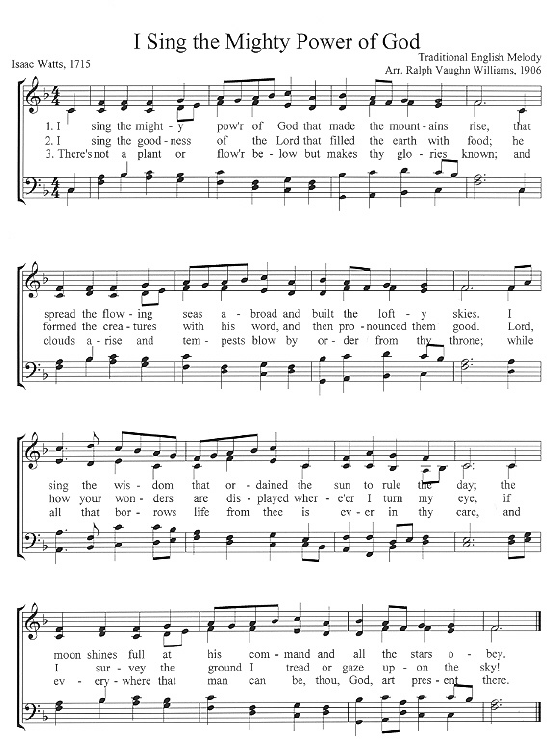I Sing the Mighty Power of God
Jeremiah 10:12-13 - He has made the earth by his power, he has established the world by his wisdom, and by his understanding has he stretched out the heavens: when he utters his voice, there is a tumult of waters in the heavens, and he causes the vapors to ascend from the ends of the earth; he makes lightnings for the rain, and brings the wind out of his treasuries. (WEB).
"I Sing the Mighty Power of God" was written by Isaac Watts (1674 - 1748). Since the early twentieth century, the text has normally been paired a tune sometimes called Forest Green, a traditional English melody arranged in 1906 by Ralph Vaughan Williams (1872 - 1958).
The hymn was originally included in a hymnal written for children, where it was entitled "Praise for Creation and Providence". Isaac Watts loved children. In 1715 he published the collection entitled Divine and Moral Songs for Children. In the preface, Watts wrote, "Children of high and low degree, of the Church of England or Dissenters, baptized in infancy or not, may all join together in these songs. And as I have endeavored to sink the language to the level of a child’s understanding . . . to profit all, if possible, and offend none." At the time of the Protestant Reformation, Martin Luther instructed his followers to sing hymns. However, the reformer John Calvin only allowed the singing of versified, or paraphrased, Scripture. By the time of Isaac Watts, the singing of psalms had become dull and lifeless. When Watts was 19 years old, he complained to his father about this. His father then challenged him to write something better. Watts then proceeded to write hundreds of hymns. In spite of being called "flights of fancy" by his contemporaries, and causing dissention in churches, Watts’ hymns are still sung and loved today. Instead of paraphrasing Scripture, "I Sing the Mighty Power of God" compiles imagery from multiple passages: the story of Creation, Genesis 1; Psalm 19:1-3; Psalm 95:3-6, the creation hymn, Psalm 104, and Jeremiah 10:12-13.
I Sing the Mighty Power of God
I sing the mighty power of God, that made the mountains rise,
[or I sing th’almighty power of God…]
That spread the flowing seas abroad, and built the lofty skies.
I sing the wisdom that ordained the sun to rule the day;
The moon shines full at God’s command, and all the stars obey.
I sing the goodness of the Lord, who filled the earth with food,
Who formed the creatures through the Word, and then pronounced them good.
Lord, how Thy wonders are displayed, where’er I turn my eye,
If I survey the ground I tread, or gaze upon the sky.
There’s not a plant or flower below, but makes Thy glories known,
And clouds arise, and tempests blow, by order from Thy throne;
While all that borrows life from Thee is ever in Thy care;
And everywhere that we can be, Thou, God art present there.
Learn more:
http://cyberhymnal.org/htm/i/s/isingthe.htm
http://www.hymnary.org/text/i_sing_the_mighty_power_of_god
https://songsandhymns.org/hymns/detail/i-sing-the-mighty-power-of-god
-
"I Sing the Mighty Power of God" was written by Isaac Watts (1674 - 1748). Since the early twentieth century, the text has normally been paired a tune sometimes called Forest Green, a traditional English melody arranged in 1906 by Ralph Vaughan Williams (1872 - 1958).
The hymn was originally included in a hymnal written for children, where it was entitled "Praise for Creation and Providence". Isaac Watts loved children. In 1715 he published the collection entitled Divine and Moral Songs for Children. In the preface, Watts wrote, "Children of high and low degree, of the Church of England or Dissenters, baptized in infancy or not, may all join together in these songs. And as I have endeavored to sink the language to the level of a child’s understanding . . . to profit all, if possible, and offend none." At the time of the Protestant Reformation, Martin Luther instructed his followers to sing hymns. However, the reformer John Calvin only allowed the singing of versified, or paraphrased, Scripture. By the time of Isaac Watts, the singing of psalms had become dull and lifeless. When Watts was 19 years old, he complained to his father about this. His father then challenged him to write something better. Watts then proceeded to write hundreds of hymns. In spite of being called "flights of fancy" by his contemporaries, and causing dissention in churches, Watts’ hymns are still sung and loved today. Instead of paraphrasing Scripture, "I Sing the Mighty Power of God" compiles imagery from multiple passages: the story of Creation, Genesis 1; Psalm 19:1-3; Psalm 95:3-6, the creation hymn, Psalm 104, and Jeremiah 10:12-13.
I Sing the Mighty Power of God
I sing the mighty power of God, that made the mountains rise,
[or I sing th’almighty power of God…]
That spread the flowing seas abroad, and built the lofty skies.
I sing the wisdom that ordained the sun to rule the day;
The moon shines full at God’s command, and all the stars obey.
I sing the goodness of the Lord, who filled the earth with food,
Who formed the creatures through the Word, and then pronounced them good.
Lord, how Thy wonders are displayed, where’er I turn my eye,
If I survey the ground I tread, or gaze upon the sky.
There’s not a plant or flower below, but makes Thy glories known,
And clouds arise, and tempests blow, by order from Thy throne;
While all that borrows life from Thee is ever in Thy care;
And everywhere that we can be, Thou, God art present there.
Learn more:
http://cyberhymnal.org/htm/i/s/isingthe.htm
http://www.hymnary.org/text/i_sing_the_mighty_power_of_god
https://songsandhymns.org/hymns/detail/i-sing-the-mighty-power-of-god
-


Comments
Post a Comment